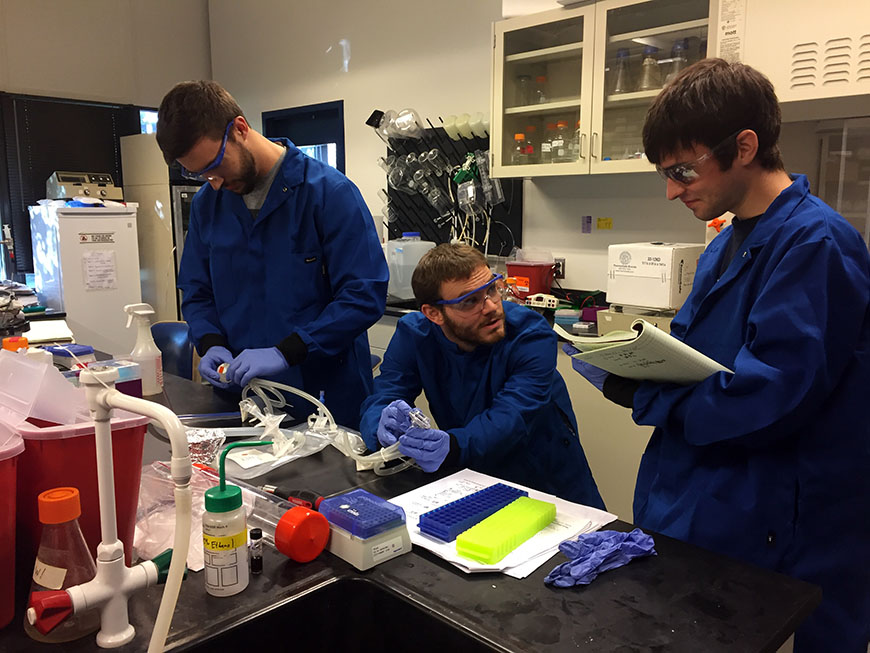NSF Grant Supports Villanova Chemical Engineering Faculty T Cell Research

Graduate students Devon Zimmerman, Kyle Spivack and Matthew Nicholas analyze the cell culture bag for surface modifications.
A $300,000 National Science Foundation grant has been awarded to three faculty members in Villanova University’s Chemical Engineering department. Assistant Professor Jacob Elmer, PhD, serves as principal investigator on the project titled “Optimizing the Isolation, Transfection, and Expansion of Chimeric Antigen Receptor (CAR-T) Cells with Modified PES Membranes.” His collaborators are Professor William Kelly, PhD, and Assistant Professor Noelle Comolli, PhD. Their research is focused on developing new technologies and techniques that streamline the production of genetically engineered T cells—a special type of white blood cell—to treat leukemia patients.
Each year, leukemia kills more than 50,000 people, but a promising new treatment called CAR-T cell therapy has been shown to effectively treat the disease. In CAR-T cell therapy, T cells are extracted from the patient and reprogrammed to seek out and attack cancer cells. They are then re-injected into the patient to eradicate the leukemia. While this treatment has been shown to be highly effective, the techniques used to extract, reprogram and grow the T cells are prohibitively expensive and time consuming.
“The goal of this project is to develop new technologies that will streamline every step in CAR-T cell therapy,” says Dr. Elmer, “and I’m looking forward to working with Drs. Kelly and Comolli to achieve that goal.” This is the first time the three professors have worked together on a major research project, and Dr. Kelly notes, “We each bring a specific area of expertise to the table.” As a biomaterials expert, Dr. Comolli is working on the first objective, which is to develop novel membranes to help isolate T cells from a patient's blood. Dr. Elmer’s role is to optimize an efficient genetic engineering technique to reprogram the isolated T cells. Lastly, Dr. Kelly, a bioprocess specialist, is leading efforts to accelerate the growth rate of the engineered T cells. Dr. Elmer believes, “Optimizing these steps will significantly decrease costs and time required for CAR-T cell therapy, thereby enabling this powerful new treatment to help more cancer patients.”
This two-year grant is providing a hands-on research opportunity for several Chemical Engineering undergraduates and graduate students. In addition, the equipment purchased for this project will be used for course demonstrations as part of learning modules that discuss CAR-T therapy. Finally, each of the experiments conducted as part of this research will be recorded to create instructional videos that can be used to train students on advanced techniques in the lab or to display lab techniques in lecture courses.
Dr. Elmer notes that the potential for this research extends beyond its primary objective: “In addition to CAR-T therapy for acute lymphoblastic leukemia, the techniques that we develop may also be applied to improve the treatment of other lymphocyte diseases (e.g. HIV or other types of leukemia) or perhaps solid cancers. The project’s cell immobilization, transfection and culture strategies may also be applied to other cell lines for many purposes (e.g. stem cell isolation or development of DNA vaccines).
